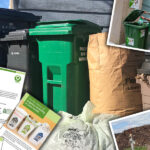Top: Image courtesy of Environmental Research and Education Foundation of Canada
A recent study conducted by the Environmental Research and Education Foundation of Canada (EREF-Canada) looked at all 10 Canadian provinces and 3 territories to get a clear understanding of their organic waste policies and approval/permitting regimes, organic waste diversion program availability across the country, and the number of operational organic waste processing facilities, along with their capacities and tons processed. In 2019, 4.83 million metric tons (Mt) (5.3 million tons) of organic waste were processed at 387 composting and anaerobic digestion (AD) facilities in Canada, which have a total processing capacity of about 5.74 Mt (6.3 million tons) — excluding capacity in the province of Quebec. For the purposes of the study, organic waste was defined as food waste that is uneaten and discarded, as well as inedible wastes such as scraps, agricultural waste (e.g. manure), biosolids, and leaves and yard trimmings. The report also focused on residential, industrial, commercial and institutional organics diversion; direct land application, backyard composting, and waste stabilization methods such as lime stabilization, fermentation, and pasteurization were not taken into consideration.
The analysis found that most provinces (with the exception of the Territories and more remote areas) have adequate processing capacity to manage more basic degradable materials like leaves and yard trimmings. For example, collectively there is enough processing capacity for 2.66 Mt (2.9 million tons) of these basic degradable materials at static pile and windrow composting facilities in Canada. However, most provinces do not have sufficient processing capacity to address larger volume and more complicated materials like source separated organics. EREF-Canada also found that the 3.08 Mt (3.4 million tons) of processing capacity at in-vessel composting and AD facilities is being used; others have a relatively small amount of buffer capacity.
Of the 4.83 Mt of organic waste processed in 2019, 72% was processed by the country’s 328 composting facilities; processing capabilities at these sites ranged from 50 metric tons (55 tons) to 150,000 metric tons (165,350 tons). The 59 AD facilities were responsible for processing 1.35 Mt (1.49 million tons) of organic waste. The total processing capacity (5.74 Mt) reflects capacity for both easily degradable organic waste like leaves and yard trimmings as well as the capacity to degrade materials that require more intensive infrastructure like source separated organics. According to EREF-Canada’s analysis, there is a shortfall of about 1.1 Mt (1.2 million tons) of total capacity when compared to the quantity of food, yard and garden waste generated annually. This shortfall in capacity becomes even more pronounced considering that the majority of this waste is more complex food waste which can require more intensive infrastructure like in-vessel and AD systems.
Other findings discussed in the 128-page report include:
- 91% of all Canadians live in an area that has a residential organic waste management program.
- Curbside collection programs are wildly available, with 83% of the population living in an area with access to curbside leaf and yard trimmings programs and 71% with access to curbside source separated organics programs.
- While the overall Canadian government’s goal is to reduce organic waste by 30% by 2030 (or 490 kg/person (1,080 lbs)), the Ontario government is shooting for a 50% to 70% reduction by 2023 or 2025, depending on the sector where the goal is applied. British Columbia has an organic waste diversion target of 95% of agricultural, industrial and municipal waste.
- Nova Scotia and Prince Edward Island in Atlantic Canada are the only two provinces with organic disposal bans. EREF-Canada found that Manitoba, Ontario and Quebec have bans under consideration.













